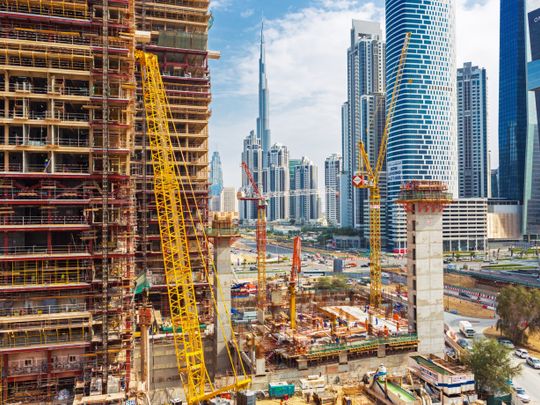
Price adjustments have made the real estate market more affordable for homebuyers, and Dubai a more competitive location to live and work. But while the market remained soft over the first half of the year, the falls have been relatively modest (less than 2 per cent in the first quarter), suggesting it is close to the bottom of the cycle, says Craig Plumb, head of research at JLL Middle East and North Africa. “The extent to which the market continues to fall or recover over the second half of the year will be dependent upon the extent to which the current economic recovery can be converted to improved sentiment,” says Plumb. “A large part of this will be dependent upon job creation.”
A recent monthly survey showed the highest Purchasing Managers Index (PMI) score, an indicator of economic activity, since October 2014. However, Plumb says this is not driven by increased employment, resulting in what Emirates NBD, which conducted the survey, describes as “a jobless recovery”. “The real estate sector is unlikely to benefit until this recovery in sales and orders leads to an increase in employment and hiring levels,” said Plumb.
Sales activity
Plumb considers a sustained increase in the volume of sales activity as an essential indicator of any recovery in the real estate market in Dubai. “The Dubai Land Department [DLD] has recognised the importance of this indicator and has identified this as a key performance indicator or market barometer,” he says. “The headline figures show that the market is stabilising, with a small increase in the value of transactions recorded in Q1 2019 [Dh53 billion], compared with the same period in 2018 [Dh49 billion]. The value of sales does, however, remain well below that recorded in Q1 2017 [Dh71 billion]. There are issues with interpreting the DLD data on transactions, but it appears that the vast majority of activity involves the sale of land plots, which comprise almost 60 per cent of the total value of sales in Q1 2019.
Responding to competitive market conditions, developers have reduced ticket prices, mostly by releasing smaller units, and offered attractive payment plans. “This has resulted in a growth in the percentage of sales in the primary [off-plan] market compared to existing projects,” says Plumb. “There was a total of Dh14 billion in sales in Q1, excluding mortgages, and almost 60 per cent were for off-plan rather than existing properties.”
Supply control
The Dubai Government has likewise announced measures that have stimulated demand, including long-term visas. “What the government has so far avoided are any measures to regulate the current high levels of supply being developed,” Plumb points out. According to JLL, more than 120,000 residences are under construction in Dubai, and more still to start construction. “This high level of new supply has resulted in the market remaining very much in the buyers’ favour,” adds Plumb. “While not all the announced projects will materialise, steps to better regulate future supply levels will help prices and rentals stabilise.”
Build for end users
Developers also need to cater more to end users, whether tenants or homeowners, not just investors, says Rajiv Ghanekar, senior real estate broker at Keller Williams Real Estate Dubai. One of the main obstacles for homebuyers are the running costs of owning a house, with the maintenance fee for a two-bedroom apartment ranging from Dh12 to Dh25 per square foot, or Dh15,500 to Dh32,500 per year for a 1,300-sq-ft two-bedder. “By simply controlling and reducing the running cost variable, we can see positive results, such as an increase in the number of first-time homebuyers,” says Ghanekar.
Mortgages and LTV
Increasing the loan-to-value (LTV) ratio from the current 75 per cent to 85 per cent can also help. “[This] could be limited to first-time homebuyers so banks can mitigate risks,” says Ghanekar, adding that revising the DLD’s 4 per cent transfer charges could also encourage more transactions.
Realistic prices
Mario Volpi, sales and leasing manager at Engel & Völkers in Dubai, says the market is also littered with overpriced properties that don’t match buyer expectations. “Dubai has some amazing properties, however, the asking prices from sellers are way above the buyer’s expectations,” says Volpi. “More sales would occur if sellers were to drop asking prices by 10-15 per cent from current levels. If [not], they should forget about selling altogether and go on to rent their properties.”












